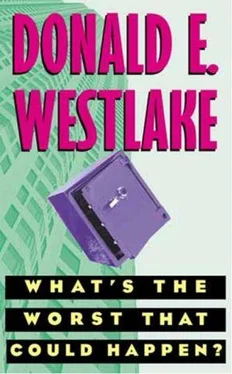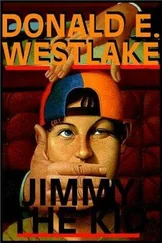“That’s right,” Dortmunder agreed. “You’re here.”
“But not this time,” Stan said darkly.
Dortmunder looked again, but he’d been right; Stan was definitely here. He decided to let that go.
Stan said, “This time, I get up into the Twenties, there it is again, those big lumber pieces painted white and red, half of Sixth Avenue all torn up, backhoes and bulldozers and who knows what all inside there, we’re down to no lanes. And you know something else?”
“No,” Dortmunder said.
“It’s always the left side! They go along, a year, two years, the left side of Sixth Avenue all tore up, and then finally they repave it, they take all the barriers away, you figure, now they’re gonna do the right side. But no. Nothing happens. Four months, six months, and then bam, they’re tearin up the left side again. If they can’t do it right, why don’t they just quit?”
“Maybe it’s a political statement,” Kelp suggested, and the door opened, and in came a hearty heavyset fellow in a tan check sports jacket and open-collar shirt. He had a wide pleasant mouth and a big round pleasant nose, and he carried a glass full of ice cubes that clinked pleasantly as he moved. This was Ralph Winslow, the lockman, who was taking Wally Whistler’s place this time because Wally, since their work together at the N-Joy, had fallen upon a mischance. He’d been waiting for a crosstown bus and hardly even noticing the armored car parked there, in the bus stop because it was also in front of the bank, and when the armored car’s alarm went off he hadn’t at first realized it had anything to do with him, so he was still standing there when the guards came running out of the bank, all of which he was still explaining to various officials deep in the bowels of authority, which meant Ralph Winslow had been phoned and was free.
“Whadaya say, Ralph?” Kelp said, and Ralph stood a moment, glass in hand, ice cubes tinkling, as though he were at a cocktail party. Then, “I say, evening, gents,” he decided, and closed the door.
“Now,” Dortmunder said, “all we need is Tiny.”
“Oh, he’s outside,” Ralph said, coming around to sit to Dortmunder’s left, where he too could watch the door.
“What, is he getting a drink?”
“Tiny? He’s got his drink,” Ralph said. “When I came back, he was explaining to some fellas there how you could cure a cold right away by squeezing all the air out of a person.”
“Uh oh,” Dortmunder said.
“Bad air out, good air in, that’s what he was saying,” Ralph explained.
Standing, Kelp said, “I’ll go get him.”
“Good,” Dortmunder said.
Kelp left the room, and Ralph said, “I understand this one’s out of town.”
“Vegas,” Dortmunder told him.
Nodding, Ralph said, “Not a bad place, Vegas. Not as good as the old days, when they were going for the high rollers. Back then, you could put on a sheet and be an oil billionaire and unlock your way through half the safes in town. These days, they’ve gone family, family oriented, mom and pop and the kids and the recreational vehicle. Your best bet now, out there, is be a midget and dress like a schoolkid off the bus.”
“I don’t think,” Dortmunder said, “it’s gone entirely Disneyland.”
“No no,” Ralph agreed, “they still got all the old stuff, only it’s adapted. The ladies on the stroll are all cartoon characters now. Polly Pross, Howdy Hooker.”
“And the twins,” Stan said, “Bim and Bo.”
“Them, too,” Ralph agreed, and the door opened, and Kelp came in, looking a little dazed. “They’re layin around on the floor out there,” he said, “like a neutron bomb.”
“Uh huh,” Dortmunder said.
Kelp continued to hold the door open, and in came a medium range intercontinental ballistic missile with legs. Also arms, about the shape of fire hydrants but longer, and a head, about the shape of a fire hydrant. This creature, in a voice that sounded as though it had started from the center of the earth several centuries ago and just now got here, said, “Hello, Dortmunder.”
“Hello, Tiny,” Dortmunder said. “What did you do to Rollo’s customers?”
“They’ll be all right,” Tiny said, coming around the table to take Kelp’s place. “Soon as they catch their breath.”
“Where did you toss it?” Dortmunder asked.
Tiny, whose full name was Tiny Bulcher and whose strength was as the strength of ten even though his heart in fact was anything but pure, settled himself in Kelp’s former chair and laughed and whomped Dortmunder on the shoulder. Having expected it, Dortmunder had already braced himself against the table, so it wasn’t too bad. “Dortmunder,” Tiny said, “you make me laugh.”
“I’m glad,” Dortmunder said.
Kelp, expressionless, picked up his glass and went around to the wrong side of the table, where he couldn’t see the door without turning his head.
“You should be glad,” Tiny told him. “So you got something, huh?”
“I think so,” Dortmunder said.
“Well, Dortmunder,” Tiny said, “you know me. I like a sure thing.”
“Nothing’s sure in this life, Tiny.”
“Oh, I don’t know about that,” Tiny said, and flexed his arms, and drank, so that for the first time you could see that he had a tall glass tucked away inside that hand. The glass contained a bright red liquid that might have been cherry soda, but was not. Putting this glass, now half empty, on the table, Tiny said, “Lay it on us, Dortmunder.”
Dortmunder took a deep breath, and paused. The beginning was the difficult part, the story about the goddam ring. He said, “Does everybody know about the ring? The ring I had?”
“Oh, sure,” Stan said, and Ralph said, “I called you, remember?” and Stan said, “I called you, too,” and Tiny, who had not called, laughed. This was a laugh, full-bodied and complete, the real thing, a great roaring laugh that made all the cartons around the walls vibrate, so that he laughed to a kind of distant church bell accompaniment. Then he got hold of himself and said, “Dortmunder, I heard about that. I wish I could’ve seen your face.”
“I wish so, too, Tiny,” Dortmunder said, and Tiny laughed all over again.
There was nothing to be done about Tiny; you either didn’t invite him to the party, or you indulged him. So Dortmunder waited till the big man had calmed himself down—caught his breath, so to speak—and then he said, “I been trying to get that ring back. I tried out on Long Island, and I tried here in the city, and I tried down in Washington, DC. Every time I missed the guy, so I never got the ring, but every time I made a profit.”
“I can vouch for that,” Kelp said, and glanced over his shoulder at the door.
“But by now,” Dortmunder said, “the problem is, all the stuff I lifted from this guy, he knows I’m on his tail.”
Kelp said, “John? Do you think so?”
“The fifty thousand we took from the Watergate,” Dortmunder said. “I think that’s the one that did it.”
Tiny said, “Dortmunder? You took fifty G outta the Watergate? That’s no third-rate burglary.”
Once again, Dortmunder let that reference sail on by, though by now he was coming to recognize its appearances, like Halley’s Comet. He said, “I think the guy was suspicious before that, when we cleaned out his place in New York—”
“Dortmunder,” Tiny said, “you have been busy.”
“I have,” Dortmunder agreed. “Anyway, after that, the guy changed his MO. Before then, he was very easy to track, he’s this rich guy that tells his companies where he’s gonna be every second, and Wally—Remember Wally Knurr?”
“The butterball,” Tiny said, and smiled in fond recollection. “He was amusing, too, that Wally,” he said. “Could be fun to play basketball with him.”
Читать дальше












